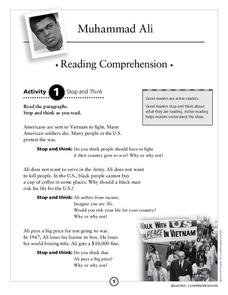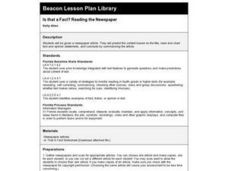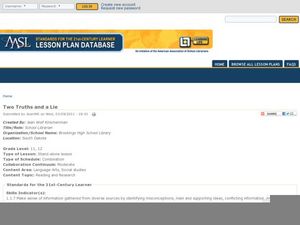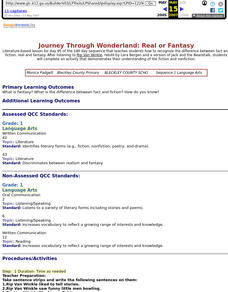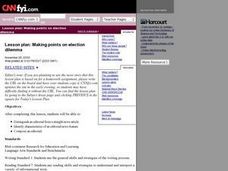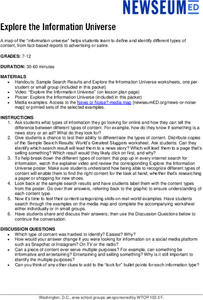Curated OER
Persuasive Writing
Use a quick bell-ringer to interest your class in the art of persuasion. They brainstorm where they find examples of persuasion in their lives and identify who is trying to persuade them. Then they either fish through magazines or look...
Library of Congress
Muhammad Ali
Muhammad Ali was the greatest, as he'd tell you himself. A set of reading comprehension worksheets walks through parts of Ali's life and promotes individuals to become good readers and writers.
Curated OER
The Vikings
High schoolers research and explore Viking culture, distinguishing between fact and fiction, and examine their contribution to our society.
Scholastic
Making Judgments Practice
Encourage young learners to identify persuasive writing techniques in a text with this resource, which includes two multiple-choice worksheets with advertisements for students to analyze.
Curated OER
Electrifying Franklin
Fourth graders research and present information about Benjamin Franklin's life and accomplishments. For this lesson on Benjamin Franklin, 4th graders review idioms and sayings written by Franklin then compare and contrast his various...
Curated OER
Identifying the Theme in a Story
Students recognize Theme through the use of simple, short stories. Using Pro Quest, students begin by researching the literary element, theme, and how it can be identified. They then identify the themes in Aesop's Fables and other short...
Curated OER
Is That a Fact, Harry?
Students use excerpts from books to determine whether sentences are fact, fiction, or opinion. They state reasons for their choices.
Curated OER
Pioneering Children on the Move
Students inquire about life for pioneer children. In this pioneer period lesson, students analyze photographs of children, make information foldables, and create a covered wagon that was typical of the ones of the past. Students will...
Curated OER
Reading And Responding: Lesson 15 Nonfiction
Eighth graders examine a nonfiction selection in a teacher led lesson. They examine the author's purpose for writing the selection and identify the difference between fact and opinion. The compare and contrast expository and narrative...
Curated OER
Teacher of the Year
Now is the time to identify the great teachers in your school! Discuss the characteristics of persuasive writing and analyze an example. Then, each pupil chooses a teacher who they feel should be named teacher of the year. They plan and...
Curated OER
Nonfiction Text Features
Identify features of a nonfiction article in this language arts lesson. Middle schoolers apply comprehension strategies as they read the parts of the article, and analyze the author's key points. Additionally, they examine information in...
Curated OER
Is that a Fact? Reading the Newspaper
Fourth graders are given a newspaper article. They predict the content based on the title, read and chart fact and opinion statements, and conclude by summarizing the article. They utilize a worksheet imbedded in this plan to guide their...
Curated OER
Mr. Lincoln's Whiskers
Learn about the events that helped shape the United States of America. Elementary schoolers explore the Civil War with six different activities. Each activity has a different focus: literature connections, primary sources, vocabulary,...
Curated OER
Two Truths and a Lie: Internet Research Skills
It's tough for high schoolers to assess what is a credible resource and what is not. A helpful resource prompts class members to research a particular topic and record two facts—and create one lie—while documenting the sources. They then...
Curated OER
Newspapers
Here is an engaging and thought-provoking presentation on newspapers. Learners identify different types of text, study layouts, look at common features, and differentiate between fact and opinion in newspapers. Photos are included, and a...
Curated OER
Multiplying in Any Order
In this mathematics worksheet, 2nd graders use counters to show an array. Then they write the multiplication fact for that array. Students also identify if the reverse of a multiplication fact is equal and explain why.
Curated OER
An Anecdote is Worth a Thousand Pictures
Students identify anecdotes in speeches and the purposes that politicians use the anecdotes for. They create personal anecdotes for the class to hear, and students decide if the anecdote is real or fabricated.
Curated OER
Journey Through Wonderland: Real or Fantasy
First graders recognize the difference between fact and fiction, real and fantasy. After listening to Rip Van Winkle, retold by Lara Bergen and a version of Jack and the Beanstalk, 1st graders demonstrates their understanding of fiction...
Curated OER
Fact, Opinion, Changes in Thinking
In this fact, opinion, and changes in thinking worksheet, students use the Double T-Chart graphic organizer to identify their thought process and summarize information. Students complete one chart.
Curated OER
Identifying Bias
In this identifying bias worksheet, students read about bias and how to identify it in their reading. They are given a list of sources of bias and they read 2 paragraphs and determine the kind of bias and their reasoning for choosing the...
Curated OER
Making Points on Election Dilemma
Students define a straight news article, and identify characteristics of an editorial news feature. They read a CNN article that examines the 2000 presidential election, and determine what is factual and what is opinion.
Curated OER
Conventions: Strong Verbs
Fifth graders practice using strong verbs. In this conventions lesson, 5th graders brainstorm words to complete sentences and list lively and exciting verbs. Students act out meanings of certain words. Students come up with new ways to...
The New York Times
Looking for Answers: Making Sense of the Boston Marathon Bombing
How should America respond to acts of domestic terrorism? What motivates or prompts a terrorist attack? After reading an opinion piece on the 2013 Boston Marathon bombing, your learners will critically analyze factors that could have...
Newseum
Explore the Information Universe
Distinguishing among different types of content when conducting online searches can be a challenge. An informative resource helps researchers identify different types of content, from fact-based reports to ads, from propaganda to satire....



